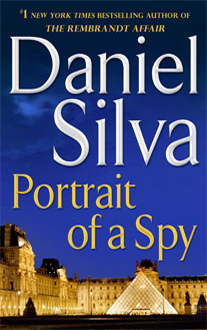Questions for Discussion
1. The book begins with a profound statement from Elie Wiesel about the power of “one person of integrity.” How do you define integrity? Where do you see it in the novel?
2. Consider the landscape of Cornwall where we first find Gabriel and Chiara. What mood does it create? What does it suggest about Gabriel’s mindset and condition?
3. When walking in Covent Garden Market, Gabriel notices the threat because his “gnawing vigilance…forced him to make a mental charcoal sketch of every passing face.” How might his artistic skills and understanding aid him as an agent?
4. Late in the novel, Gabriel is described as a painter who possesses “the meticulous draftsmanship of the Old Masters” and the “freedom of the Impressionists.” Where do you see these opposing qualities in his work with the agency?
5. While Puteaux Madonna and Child with Mary Magdalene is a fictitious painting by Titian, it is threaded throughout the novel. What does the title and its various mentions add or suggest?
6. How would you describe the relationship between Gabriel and Chiara? What does their intimate interaction add to the thrilling, tense subject matter?
7. Consider the powerful and complex character of Nadia al-Bakari. How does she represent the challenge and tension between the Middle East and the West? What of her extensive experience helps explain her willingness to forgive and even to help those who killed her father? What role does art play in her life?
8. Just before Nadia’s important and dangerous meeting in a hotel in Dubai, she speaks with Gabriel beneath a small metallic cloth tent to protect them from surveillance. He refers to it as a copiously chuppah, beneath which vows are taken in the Jewish wedding ceremony. How is this significant to this moment in the novel? What is the complex nature of the relationship between the two of them?
9. What do the many intelligent and powerful women in the novel add to the exploration of equal rights and their suppression? Which woman is the most compelling to you? Why?
10. Throughout the novel, we are introduced to various male characters and their wives. What is the overall effect of this? How does it connect to the larger theme of gender equality that gets explored?
11. The modern media—both its nature and role in politics—is presented and explored in the novel and even figures into the activities of the various agencies. What are the pros and cons of such technologically evolved, global journalism? To what extent is it or should it be an element of politics? The military?
12. At one point Adrian Carter lashes out at the journalistic use of “narrative,” and suggests that they should report “facts” while novelists create narrative. What should be the limits of storytelling (however factual) in news reporting? What is the role or responsibility of the novelist to inform?
13. In what ways is “finint,” or financial intelligence, more valuable or volatile than traditional human or signals sources?
14. What do the intense auction scenes at Christie’s bring to the novel?
15. Consider the extensively described desert landscapes. What moods do they evoke? What do they add to any understanding of the political and personal history of the regions? In what ways is it possible for such barren land—even when a place of horrendous violence and suffering—to seem beautiful?
16. When Gabriel mentions the surviving families of the tragedies in Paris, Copenhagen, and London, Adrian Carter says, “That’s an emotional response,” and “James McKenna doesn’t tolerate emotion when it comes to talking about terrorism.” And yet Gabriel, Nadia, and Ali al-Masri have powerful emotional interactions. What is an appropriate role of emotional response and understanding of others in such a challenging international climate?
17. When interrogating Gabriel and referring to his involvement despite a supposed retirement, Kahlid says “your son has everything to do with this.” In what ways is this true?
18. Lying is a necessary part of Gabriel’s work, but even he says to only “lie as a last resort.” Outside the dangerous world of the spy, what are proper criteria for deciding when to lie?
19. A number of times in the novel, an important agency maxim is stated: “Hope is not an acceptable strategy when lives are at stake.” What is the value of hope? When is it appropriate?





























